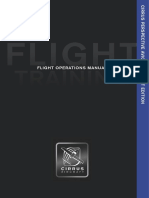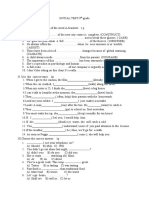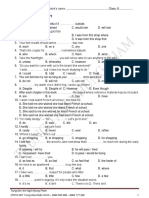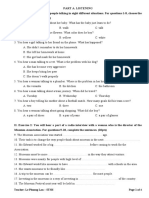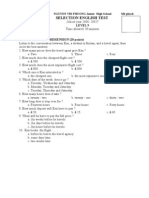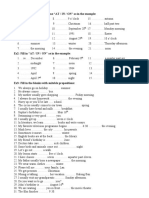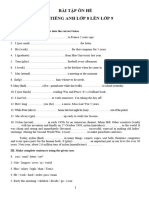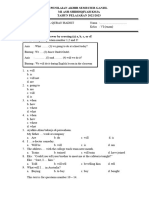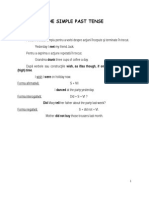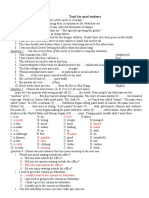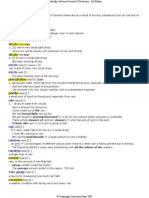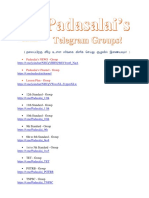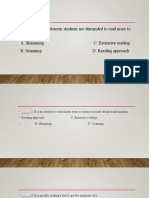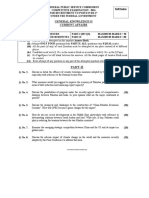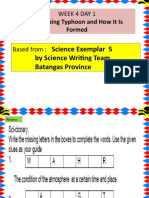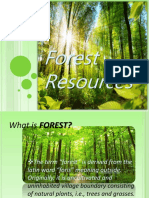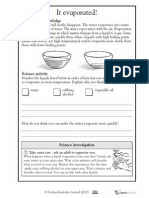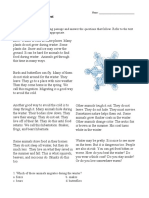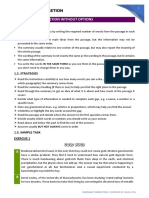Q4 L5 CHUẨN BỊ CHO BUỔI TỚI
Q4 L5 CHUẨN BỊ CHO BUỔI TỚI
Uploaded by
Hoài Anh NguyễnCopyright:
Available Formats
Q4 L5 CHUẨN BỊ CHO BUỔI TỚI
Q4 L5 CHUẨN BỊ CHO BUỔI TỚI
Uploaded by
Hoài Anh NguyễnCopyright
Available Formats
Share this document
Did you find this document useful?
Is this content inappropriate?
Copyright:
Available Formats
Q4 L5 CHUẨN BỊ CHO BUỔI TỚI
Q4 L5 CHUẨN BỊ CHO BUỔI TỚI
Uploaded by
Hoài Anh NguyễnCopyright:
Available Formats
Q4 – LESSON 5 Student’s name:...............................................Class: 8C................Date:..............
LISTENING
QUESTIONS 11 – 20
Questions 11 – 16. Complete the flow chart below.
Choose SIX answer from the box and write the correct letter, A – G, next to questions 11 – 16
A. air B. ash C. earth D. grass
E. sticks F. stones G. water
MAKING A STEAM PIT
Dig a pit
Arrange a row of (11) ……………………. over the pit.
Place (12) ……………………. on top.
Light the wood and let it burn out.
Remove (13) …………………….
Insert a stick
Cover the pit with (14) …………………….
Place wrapped food on top, and cover it with (15) …………………….
Remove the stick and put (16) ……………………. into the hole.
Questions 17 - 18. Choose TWO letters, A – E. Which TWO characteristics apply to the bamboo
oven?
A. It’s suitable for windy weather.
B. The fire is lit below the bottom end of the bamboo.
C. The bamboo is cut into equal lengths.
D. The oven hangs from a stick.
E. It cooks food by steaming it.
Questions 19 – 20. Choose TWO letters, A – E. Which TWO pieces of advice does the speaker
give about eating wild fungi.
A. Cooking doesn’t make poisonous fungi edible.
B. Edible wild fungi can be eaten without cooking.
C. Wild fungi are highly nutritious.
D. Some edible fungi look very similar to poisonous varieties.
E. Fungi which cannot be identified should only be eaten in small quantities.
Trung tâm Anh Ngữ Nhung Phạm
27N7A KĐT Trung Hòa Nhân Chính – 0946 530 486 – 0964 177 322 1
B. GRAMMAR
I. Choose the correct answer
1. The table was made ……………. a carpenter.
A. by B. with C. from
2. A jewellery shop ……………. last night.
A. was broken into B. has been broken into C. had been broken into
3. The flowers need ……………. once a day.
A. to being watered B. to be watered C. been watered
4. The building ……………. by a French architect.
A. will design B. will be designed C. will be designing
5. The omelette was made ……………. mushrooms and cheese.
A. by B. with C. from
6. The letter must ……………. immediately.
A. be sent B. being sent C. to be sent
7. Lisa likes ……………. flowers.
A. being given B. been given C. to being given
8. Breakfast ……………. at 8 o’clock every day.
A. was serve B. is served C. has been served
II. Reported the conversation
0. “I’m going to the park with my brother,” Paul said.
…Paul said (that) he was going to the park with his brother…
9. “We’re going to have a game of football,” he said.
He said that they were going to have a game of football.
10. “I might come too,” Stephen said.
Stephen said that she might come too.
11. “We’ll be in our usual place,” Paul said.
Paul said they would be in their usual place.
12. “I can’t stay long because my friends are coming at six,” Stephen said.
Stephen said that she couldn’t stay long because her friends were coming at six.
13. “They’re taking me to the skate park in Burnley,” he said.
He said they were taking him to the skate park in Burnley.
14. “I’ve never been there before,” he said.
He said he had never been there before.
15. “I’d like to go to the skate park in Manchester,” Paul said.
He said he would like to go to the skate park in Manchester.
16. “We could go together,” Stephen said.
Stephen said we could go together.
III. Write these sentences in indirect speech, changing words where necessary
17. “I’ll see you tomorrow,” she said.
She said she would see me the following day.
18. ‘I saw her today,” he said.
He said he had seen her this day.
Trung tâm Anh Ngữ Nhung Phạm
27N7A KĐT Trung Hòa Nhân Chính – 0946 530 486 – 0964 177 322 2
19. “I don’t like this film,” she said.
She said she didn’t like that film.
20. She said, “We went swimming today.”
She said that they had gone swimming this day.
21. “I’ll see Mary on Sunday,” she said.
She said she would see Mary on Sunday.
22. “I met her about three months ago,” he said.
He said he had met her about three months ago.
23. “Pete and Sue are getting married tomorrow,” she said.
She said Pete and Sue were getting married the following day.
24. “Stephen’s bringing some records to the party tonight,” he said.
He said Stephen was bringing some records to the party the following night.
25. “I really like this furniture,” she said.
She said she really liked that furniture.
26. “My parents are arriving tomorrow,” she said.
She said her parents were arriving the following day.
27. “We visited her this morning,” they said.
They said they had visited her that morning.
28. “We’ll see her next week,” they said.
They said they would see her the following week.
29. “They were here three months ago,” he said.
He said they had been here three months ago.
30. “I’m meeting them at four o’clock today,” he said.
He said he was meeting them at four o’clock this day.
31. “I can see you tomorrow,” she said.
She said she could see me the following day.
IV. Put in the correct pronouns (I etc) or possessives (my etc)
0. “She likes me.” He knew she liked …him…
32. “I speak French.” He said he spoke French.
33.“I’m sorry.” She said she was sorry.
34.“Kate phoned me.” She said Kate had phoned her.
35.“We want our money.” They said they wanted their money.
36.‘I’m tired.” He said he was tired.
37.“I can’t help you.” She told me she couldn’t help me.
38.“We’re leaving.” They said they were leaving.
39.“I’ve lost my coat.” He said he had lost his coat.
40.“I like my job.” She told me she liked her job.
41.“Where are our tickets?” They asked where their tickets were.
V. Complete the reported statements. Use one word in each gap
0. ‘I can’t understand this film,’ she said.
She said she couldn’t understand …the… film.
42. “I’m playing football this evening,” I told Tom.
I told Tom I was playing football that evening.
Trung tâm Anh Ngữ Nhung Phạm
27N7A KĐT Trung Hòa Nhân Chính – 0946 530 486 – 0964 177 322 3
43.She said, “There was an accident here last year.”
She said there had been an accident there the year before.
44.“I ordered two books three weeks ago,” I told the shop assistant.
I told the shop assistant I’d ordered two books three weeks before.
45.On Sunday, Adam told me, “I’ve got an exam tomorrow.”
Adam told me he had an exam on Monday.
46.“I’ll be in your group next term,” she said.
She said she’d be in my group the following term.
47.“I’m leaving now,” she told us.
She told us she was leaving then.
48.“It’s really cold today,” Lucy told me.
Lucy told me it was really cold this day.
49.“I finished my exams last week,” he said.
He said he had finished his exams the previous week.
VI. Underline the correct answer
50. I said / told the driver I wanted to stop.
51. My mother said / told there was a letter for me.
52. Everybody said / told I looked beautiful.
53. Why did you say / tell the lessons were expensive?
54. Ross said / told the waiter he couldn’t pay.
55. I didn’t say / tell Peter that I was going away.
56. Nobody said / told me that the shop was closed.
57. Mia said / told that she would wait at the bus stop.
VII. Complete each sentence, using “say, tell, speak” in an appropriate form
58. Daniel told me that he was playing in the school basketball team.
59. I spoke to Helen, and she said she would phone you.
60. “You’re lucky.” Said Steve. “I tell you that you would win!”
61. A translator told the President what everyone was saying.
62. “Look,” I told her, “why don’t you tell me what you mean?”
63. I told my teacher that I was speaking Chinese, but she didn’t believe me.
C. VOCABULARY
I. Write one word in each gap.
SAN FRANCISCO
Tourists to San Francisco are rarely disappointed (64) with the famous range of cultural and artistic
attractions the city has to offer. But San Francisco is more famous (65) for being on the San Andreas
fault, a notorious source of earthquakes. Over seven hundred people died in San Francisco in the great
earthquake of 1906, and more than 70 perished in another large quake in 1989. It’s hard (66) to imagine
why anyone would want to live in such a dangerous area, but millions of people choose to do so. They
are all familiar (67) with the faultline, and are aware (68) of the potential danger if there’s another
powerful quake. Yet nothing, it seems, will prevent people (69) from building in San Francisco. A quick
glance (70) at a photo of the city shows a large number of modern skyscrapers, many of them
completely covered (71) with glass.
Trung tâm Anh Ngữ Nhung Phạm
27N7A KĐT Trung Hòa Nhân Chính – 0946 530 486 – 0964 177 322 4
Seismologists are constantly warning residents (72) against the possibility of ‘the next big quake’.
They expect it (73) will happen sooner rather than later. But San Franciscans are not short (74) of
courage. Except (75) for making doubly sure that their buildings are built to the highest safety standards,
they carry on with their daily lives as if nothing could ever disrupt them.
II. Complete the sentences by changing the form of the word in capitals when this is necessary.
76. The forecast said there was a high likelihood (LIKELY) of rain this weekend.
77. We all know that using our cars causes pollution (POLLUTE), but we still do it.
78. Forecasting the weather accuracy (ACCURATE) takes a great deal of training.
79. Litter is often a problem in residental (RESIDENT) areas.
80. According to environmentalist (ENVIRONMENT), we could be facing a crisis within fifty years.
81. It was a wonderfully sunny (SUN) day, so we decided to go to the beach.
82. The giant panda is dangerous (DANGER) because its habitat is being destroyed.
83. We didn’t enjoy our walk because it was absolutely freezing (FREEZE)!
D. READING
Read the text below and choose the correct word from each space.
PONY EXPRESS
Before 1860 there was no quick way of getting mail (84) ……………… the east and the west of the
United States. There were no railways at that (85) ……………… and most mail was sent by coach. It
usually (86) ……………… at least 25 days for coaches to (87) ……………… the coast. So in 1860 it (88)
……………… decided to send mail by ‘Pony Express’, which was much faster. Riders (89) ………………
very fast horses were placed along the route.
They were at (90) ……………… distances from each other and the mail was handed from one rider
to the next. Riders were all (91) ……………… to travel between twenty and thirty kilometers (92)
……………… day on very bad roads. At each stop two minutes were (93) ……………… for exchanging
the mail bags, but riders were often held up by awful weather (94) ……………… closed the roads. With
the invention of the telegraph in 1861, the demand for Pony Express disappeared.
84. A. between B. from C. among D. by
85. A. time B. date C. age D. season
86. A. spent B. lasted C. took D. passed
87. A. get B. arrive C. come D. reach
88. A. had B. was C. has D. is
89. A. for B. off C. with D. behind
90. A. like B. equal C. same D. level
91. A. wished B. wanted C. expected D. hoped
92. A. a B. one C. some D. any
93. A. let B. allowed C. done D. made
94. A. which B. where C. what D. when
Trung tâm Anh Ngữ Nhung Phạm
27N7A KĐT Trung Hòa Nhân Chính – 0946 530 486 – 0964 177 322 5
You might also like
- VIH Helicopter Mountain Flying ManualDocument84 pagesVIH Helicopter Mountain Flying ManualDynamicBowlRover100% (8)
- Avanzando Unit 123Document13 pagesAvanzando Unit 123Maria Jose Amorin UscataNo ratings yet
- Falcon 20 Study GuideDocument13 pagesFalcon 20 Study GuidemacvsogchingaNo ratings yet
- Cirrus FomDocument222 pagesCirrus FomPreston BakicNo ratings yet
- Q2 - LESSON 3 Student's name: Nguyễn Bảo An Class: 8A9Document11 pagesQ2 - LESSON 3 Student's name: Nguyễn Bảo An Class: 8A9Kane HarryNo ratings yet
- Exercitii Bilingv 2Document4 pagesExercitii Bilingv 2Olteanu Andreea RosaliaNo ratings yet
- 2º Bachillerato InglesDocument90 pages2º Bachillerato InglesAnonymous VM4jMQNo ratings yet
- ..................... I Use Your Telephone, Sir?Document3 pages..................... I Use Your Telephone, Sir?Mihețiu MihaelaNo ratings yet
- Passive and Causative. RoyalDocument4 pagesPassive and Causative. RoyalRocío Pérez BuenoNo ratings yet
- Past SimpleDocument4 pagesPast SimpleMiguel Angel Asto HuamaniNo ratings yet
- Lesson 23Document4 pagesLesson 23Phạm Khắc TrungNo ratings yet
- Bộ đề kiểm tra HKII tiếng Anh lớp 8 (Phần 1)Document15 pagesBộ đề kiểm tra HKII tiếng Anh lớp 8 (Phần 1)nguyenanhmaiNo ratings yet
- Teste Olimpiada EnglezaDocument10 pagesTeste Olimpiada EnglezaStelaNicolescuNo ratings yet
- 8a+d Offline L4Document5 pages8a+d Offline L4Phạm Khắc TrungNo ratings yet
- Grammar Focus 3: Relative ClausesDocument6 pagesGrammar Focus 3: Relative ClausesHồng Hoa Trần Thị0% (1)
- Advanced Vocabulary Review 8.4Document3 pagesAdvanced Vocabulary Review 8.4Hopeful LightNo ratings yet
- Subiect Olimpiada Judeteana Cls. 7Document3 pagesSubiect Olimpiada Judeteana Cls. 7Mirela ChirvăsuțăNo ratings yet
- Level CC1 Final Practice 1Document4 pagesLevel CC1 Final Practice 1api-3706282No ratings yet
- KLS 6 STS2 BingDocument4 pagesKLS 6 STS2 Bingyohana sNo ratings yet
- A. Grammar and Vocabulary I. Choose The Best Answer Among A, B, C orDocument4 pagesA. Grammar and Vocabulary I. Choose The Best Answer Among A, B, C orGia Đức VươngNo ratings yet
- On Kien Thuc Va Ki NangDocument3 pagesOn Kien Thuc Va Ki NangQuỳnh NhưNo ratings yet
- Grammar 6 Indirect Speech PracticeDocument7 pagesGrammar 6 Indirect Speech PracticeELENANo ratings yet
- 7TH JUNIORS- WEEK 35Document11 pages7TH JUNIORS- WEEK 35gabrielaNo ratings yet
- Kisi Kisi Lintas MinatDocument7 pagesKisi Kisi Lintas Minatafifah zulfa mustikaNo ratings yet
- Pemerintah Kota Depok Dinas Pendidikan Dan Kebudayaan Unit Pelayanan Teknis SMK Insan Aqilah 3 Sawangan DepokDocument3 pagesPemerintah Kota Depok Dinas Pendidikan Dan Kebudayaan Unit Pelayanan Teknis SMK Insan Aqilah 3 Sawangan Depokaden galangNo ratings yet
- 8.further Practice - Past TensesDocument5 pages8.further Practice - Past TensesGuadaaNo ratings yet
- English Language ExercisesDocument23 pagesEnglish Language ExerciseskojangngoaeNo ratings yet
- 7A Q2 L3 TRÊN LỚP + HWDocument7 pages7A Q2 L3 TRÊN LỚP + HWngodangkhoi100No ratings yet
- Mạo TừDocument3 pagesMạo TừHà TiênNo ratings yet
- Phần Chưa LàmDocument4 pagesPhần Chưa LàmHoàng LinhNo ratings yet
- Ioana 8Document58 pagesIoana 8Claudia ClaudiaNo ratings yet
- Contoh Soal Final Nasional ShareDocument19 pagesContoh Soal Final Nasional ShareLiaisna100% (1)
- Locking To Have Talking Being To Open To Take Sky-Diving StartingDocument6 pagesLocking To Have Talking Being To Open To Take Sky-Diving StartingGia AN LêNo ratings yet
- De HSG Anh Van 9 Co Dap An 4Document8 pagesDe HSG Anh Van 9 Co Dap An 4Chi MinhNo ratings yet
- INGLES Tecnico PDF FINALDocument12 pagesINGLES Tecnico PDF FINALnahuel20132015No ratings yet
- Grammar Review: Exercise 1: Supply The Correct Verb FormsDocument4 pagesGrammar Review: Exercise 1: Supply The Correct Verb FormsNgoc YenNo ratings yet
- Test PapersDocument4 pagesTest PapersSimona CosteaNo ratings yet
- Passive Voice ExercisesDocument7 pagesPassive Voice ExercisesTani LereleNo ratings yet
- Gioi Tu Lop 7 Cuc ChuanDocument5 pagesGioi Tu Lop 7 Cuc ChuanYa LiNo ratings yet
- Invited Stopped Talked Stayed Travelled Enjoyed Didn't Sleep Didn't Get Watched Was ListenedDocument7 pagesInvited Stopped Talked Stayed Travelled Enjoyed Didn't Sleep Didn't Get Watched Was ListenedecmNo ratings yet
- Grade 8Document20 pagesGrade 8Nguyen Le HanhNo ratings yet
- Bài tập ôn 8 lên 9 part 1Document6 pagesBài tập ôn 8 lên 9 part 1doduong5102003No ratings yet
- Lessons 9 - 10: I. Put The Verbs in Brackets in Correct FormDocument3 pagesLessons 9 - 10: I. Put The Verbs in Brackets in Correct FormKiên LêNo ratings yet
- Soal PTS Genap Epp Bahasa Inggris Kelas 7 2019-2020Document6 pagesSoal PTS Genap Epp Bahasa Inggris Kelas 7 2019-2020ariputrakurniawan24No ratings yet
- Trung Tâm Ngoại Ngữ Nq Education 25N7A & 27N7A dãy 2 đường Nguyễn Thị Thập, Thanh Xuân, Hà Nội - 0961 779 366Document7 pagesTrung Tâm Ngoại Ngữ Nq Education 25N7A & 27N7A dãy 2 đường Nguyễn Thị Thập, Thanh Xuân, Hà Nội - 0961 779 366Sarah NguyễnNo ratings yet
- Bahasa Inggris SMSTR 1 Kelas 6Document4 pagesBahasa Inggris SMSTR 1 Kelas 6haya nuraqilaNo ratings yet
- 8C Q4 L4 - CHUẨN BỊ CHO BUỔI TỚIDocument5 pages8C Q4 L4 - CHUẨN BỊ CHO BUỔI TỚIHoài Anh NguyễnNo ratings yet
- Q1 - Lesson 4 A. Grammar I. Choose The Correct Answer: Be Disagree Do Include Know Look See Seem UnderstandDocument4 pagesQ1 - Lesson 4 A. Grammar I. Choose The Correct Answer: Be Disagree Do Include Know Look See Seem UnderstandPhạm Khắc TrungNo ratings yet
- Bài Tập Tiếng Anh Lớp 10 Của Mai Lan HươngDocument162 pagesBài Tập Tiếng Anh Lớp 10 Của Mai Lan HươngDanh ThânNo ratings yet
- Mihaita 2Document64 pagesMihaita 2Lili LiliNo ratings yet
- Unit 10Document9 pagesUnit 10Seda AltınNo ratings yet
- Tests For Good Sts E9 Cua Bo GDDTDocument36 pagesTests For Good Sts E9 Cua Bo GDDTHai Dang HoNo ratings yet
- Final Review 4th Year 0809Document2 pagesFinal Review 4th Year 0809Alejandro Gamarra CascalesNo ratings yet
- English Pratice QuizDocument4 pagesEnglish Pratice QuizNguyễn Phúc ThànhNo ratings yet
- De Thi Tuyen Sinh Lop 10 Mon Tieng Anh Chuyen Tinh Quang Binh 20162017Document4 pagesDe Thi Tuyen Sinh Lop 10 Mon Tieng Anh Chuyen Tinh Quang Binh 20162017Minh Nguyệt50% (2)
- PRACTICE TEST 23 (2022) : Part I: Listening New Sports CentreDocument7 pagesPRACTICE TEST 23 (2022) : Part I: Listening New Sports CentretmNo ratings yet
- Grammar Review Terms 1&2 (1º Bach.)Document9 pagesGrammar Review Terms 1&2 (1º Bach.)Raul GallegoNo ratings yet
- Verb Tenses and Modal Verbs PracticeDocument4 pagesVerb Tenses and Modal Verbs Practiceld25No ratings yet
- De Thi Tuyen Sinh Lop 10 Chuyen Quoc Hoc Hue Mon Anh Van 09-10-3997Document8 pagesDe Thi Tuyen Sinh Lop 10 Chuyen Quoc Hoc Hue Mon Anh Van 09-10-3997Khanhthuy19992009No ratings yet
- Septiembre 1 BachDocument12 pagesSeptiembre 1 BachTaTeacherNo ratings yet
- English Language for Lower Primary: Early Childhood Education WorkbookFrom EverandEnglish Language for Lower Primary: Early Childhood Education WorkbookNo ratings yet
- PHY 205 Exam 1 Fall 2014 URIDocument5 pagesPHY 205 Exam 1 Fall 2014 URIlyndsey_erin_aguiarNo ratings yet
- Imagist Poems - Class of 2021 1.: PetrichorDocument3 pagesImagist Poems - Class of 2021 1.: PetrichorPaulaNo ratings yet
- Observed Expected Observed Expected Row Total Candy Flavor Elementary School Junior High School 90 50Document4 pagesObserved Expected Observed Expected Row Total Candy Flavor Elementary School Junior High School 90 50Carl Angelo MartinNo ratings yet
- Rain VocabularyDocument3 pagesRain VocabularyJamil AkhtarNo ratings yet
- Rocks and Minerals WebquestDocument4 pagesRocks and Minerals Webquestapi-264220291No ratings yet
- 11th English Slip Test Questions PDFDocument3 pages11th English Slip Test Questions PDFc.sujithNo ratings yet
- 2nd Periodical Test in 21stDocument30 pages2nd Periodical Test in 21stCynthia LuayNo ratings yet
- HW 1 AnswersDocument2 pagesHW 1 AnswersRome100% (1)
- Building Mat 08-09Document39 pagesBuilding Mat 08-09takishiNo ratings yet
- Current Affairs 2016 Merged MergedDocument53 pagesCurrent Affairs 2016 Merged MergedMubashar hussainNo ratings yet
- Sharp SJ-P58M-GY Fridge Service ManualDocument44 pagesSharp SJ-P58M-GY Fridge Service ManualAnonymous 2iQ1B59No ratings yet
- Fog Dew and FrostDocument3 pagesFog Dew and FrostTanvir HasanNo ratings yet
- Climate Effects of The 1883 Krakatoa EruptionDocument10 pagesClimate Effects of The 1883 Krakatoa EruptionManea SilviuNo ratings yet
- 2nd Year Natural DisastersDocument3 pages2nd Year Natural DisastersLuana MarinNo ratings yet
- Sci PPT q4wk4 DDocument85 pagesSci PPT q4wk4 DJonah C. CresmundoNo ratings yet
- Forest ResouresDocument36 pagesForest ResoureskhimNo ratings yet
- IC Joshi Aviation Met Total QDocument89 pagesIC Joshi Aviation Met Total QadityaNo ratings yet
- Unit I - Human Comfort and Design of Building Elements PDFDocument32 pagesUnit I - Human Comfort and Design of Building Elements PDFujjwal kaulNo ratings yet
- Ridho RhomamenkDocument18 pagesRidho RhomamenkCartycaMilanooNo ratings yet
- DDDDDDDocument2 pagesDDDDDDapi-254428474No ratings yet
- Rounded Polycrystals, Wind Crusts, and Melt-Freeze CrustsDocument2 pagesRounded Polycrystals, Wind Crusts, and Melt-Freeze CrustsSerkan SancakNo ratings yet
- EarthSci Module 4 Moisture Clouds and PrecipitationDocument6 pagesEarthSci Module 4 Moisture Clouds and PrecipitationPia Cassandra GamboaNo ratings yet
- Tenses MaterialDocument10 pagesTenses Material10B-10.BHUMIKA KOCHARNo ratings yet
- Compre 1Document6 pagesCompre 1DTMKarimNo ratings yet
- Summary CompletionDocument18 pagesSummary Completion31. Thu UyênNo ratings yet
- UtilityPoleBook060617Document38 pagesUtilityPoleBook060617UlisesManuel GonzalezNo ratings yet
- Vishrambaug Wada Case Study NewDocument1 pageVishrambaug Wada Case Study NewKavya DesaiNo ratings yet



